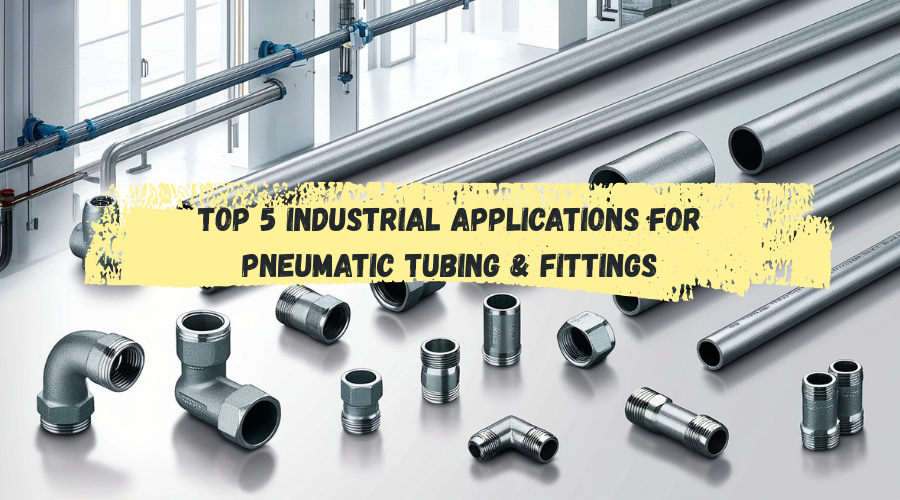Top 5 Industrial Applications for Pneumatic Tubing & Fittings
It is not hard to observe huge production lines, robots, and big machines when we see modern industries. However, in the background, minor details such as pneumatic fittings and
pneumatic tubing are quietly running everything smoothly. These are the building blocks of numerous processes, which, by use of such simple yet effective components, make machines move, products be packaged, and tools be highly efficient. In this article, we’ll explore the top five industries that rely heavily on pneumatic tubing and fittings, along with their benefits and future importance.
1. Automotive Industry
Automotive factories are crowded with robot arms, robot tools and robot assembly lines. Each of them relies on the pneumatic systems to accomplish the task in a fast and safe way.
Tubing refers to pipes that transport compressed air to work areas, where it is used for welding, painting, and assembling cars. In automotive settings, materials like nylon and polyurethane tubing are most commonly used due to their superior resistance to abrasion and flexibility, which are crucial for withstanding the demanding conditions present in manufacturing environments. Nylon is known for its durability and high-pressure capacity, while polyurethane provides the flexibility needed for tight spaces and intricate pathways.
Fittings also ensure that there is ease in connecting or disconnecting equipment when required. Pneumatics are less polluted than hydraulic systems, because no oil spills. These systems enable car manufacturers to do it faster, more efficiently, and at a lower cost without them.
2. Food and Beverage Industry
Food and beverages are most concerned with cleanliness and pneumatics is an excellent fit. Packaging, filling of bottles, sealing of packets etc, are done using air-powered machines. Polyurethane and Teflon tubing are preferred due to their resistance to chemicals and ease of cleanability. No oil is dealt with and thus the threat of contamination is minimal. This is why pneumatics is a good option since it ensures food is safe and products are packed quickly and in good condition.
3. Pharmaceutical Industry/Medical.
Pneumatic components are essential in hospitals, medical factories, and other similar settings. They allow free breathing atmosphere and are simple to sterilize. Small pneumatic tubing is used to provide accurate air pressure on devices such as ventilators, respirators and dental tools. Airtight fittings used in the production of medicines eliminate leakages in sensitive surroundings.
These systems are also hygienically strict, thus, safe as far as healthcare use is concerned. Pneumatics save lives in short, hence, powering necessary medical equipment.
4. Packaging and Logistics
Consider how fast products box, seal and label. A great deal of that rapidity is pneumatic. Pneumatic tubing drives labeling devices, sealing machines and conveyors. Quick-connect fittings ensure that machines on busy packaging lines are easily reconfigured. Air-driven systems have high speeds that cut on delays. This has made firms rely on pneumatics to meet customer demand as well as to facilitate smooth handling of materials.
5. Heavy Machinery and Automation
Pneumatics are also used in large industries and construction places. In this case, the most important are durability and power.
The reason is that nylon tubing can manage high pressure and demanding conditions. Air lines used to power robots, industrial tools and heavy conveyors are interconnected by fittings. Pneumatics save time because they do not need much maintenance as hydraulic systems. Pneumatics are a painless option to industries that require strength and dependability.
6. The Reason Industries use Pneumatic Tubing and Fittings
Pneumatics is popular in all these industries since they are:
Safe and Clean - No oil spills, such as hydraulic systems.
Inexpensive - Durable components that do not need a substantial amount to change.
Adaptable -you can have it in other materials according to the requirements.
Quick and powerful - Ideal in fast jobs.
International-friendly Global regular sizes are easy to fit international systems.
These benefits justify why pneumatic parts would remain a favorite in many industries.
7. Pneumatic tubing Types
Selecting the proper tubing is determined by the application:
Nylon Tubing- Powerful, tough and non-reactive.
Polyurethane Tubing - Bendable, flexible and suited to spaces with tight requirements.
Teflon Tubing - Resists high temperatures and vicious chemicals.
The different types have their own fitting that fits perfectly with the right fittings.
8. Popular Pneumatic Fittings
The fittings are small yet have a large role to play. The most widespread are:
Straight connectors - Use two tubes in a line.
Elbow fittings- helpful on sharp turns.
Tee and Y fittings - Divide air into many.
Banjo fittings - Provide flexibility on the system.
Quick couplers - Allow you to switch tools in a hurry, without losing air.
A combination of such fittings ensures that the air flows where it is required.
9. Why Metric Pneumatics are Important
A significant number of industries use metric-sized tubing and fittings due to the following reasons:
• Easy to fit in world systems.
• Give enhanced sealing and precision.
• Minimize downtime in cases of replacement.
As businesses go global, metric components are replacing other components.
10. The Future of Pneumatics
Pneumatics will continue to expand as industries become smarter and more automated. Here’s to expect is smarter systems to attach sensors to for better monitoring. Green materials to make production greener. Heavy fittings to work with increased pressure and harsh conditions. Pneumatics will not be a forgotten thing in constructing the factories of tomorrow.
Conclusion
Pneumatic tubing and fittings are useful in nearly all industries, including the production of cars, food packaging, and the saving of lives in hospitals. They are low-cost, safe, and straightforward solutions, which keep operations moving. With the increasing need for faster, cleaner, and more intelligent systems in industries, pneumatics will become even more valuable.
